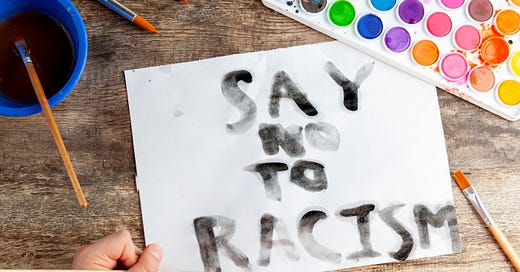Talking About Racism Does Make Kids Less Racist
A new study confirms that colorblindness doesn't work.
Hi, everyone. I’m sharing this week’s free newsletter a day early in honor of Juneteenth.
If you’re reflecting on our country’s long and difficult history with racism today, you may also have been wondering what you should be doing as a parent to raise anti-racist kids. As it so happens, a new study published in the journal Developmental Psychology confirms one essential step: We need to talk to our kids about race and racism. (And by “we,” I mainly mean white parents; parents of color already talk to their kids about racism because they have little choice.)
For years, research has been raising concerns about the popular practice known as “colorblind parenting.” Many white parents think it’s best to avoid the topic of race in an attempt to raise kids who “don’t see color,” and although this idea is well-intentioned, it simply doesn’t work.
Kids do see skin color — even as babies! — and they also notice and try to understand our society’s salient racial hierarchy. They notice that, for instance, all but one U.S. president has been white, and that that more working-class people are people of color. If we don’t tell our kids that racism is what drives these trends, they can instead assume that white people have more power because they’re inherently smarter or “better.”
We have seen from recent studies that colorblindness doesn’t work. One study found that kids aged 8 to 11 who were primed to think in a “colorblind” way — told that race isn’t important and that everyone, regardless of skin color, is essentially the same — were less likely to identify racial bias when it occurred than were children primed to adopt a more race-conscious approach.
But is the reverse also true? Does talking to kids about race really make them less racist? Some research has suggested this, and now, a new study takes the field a step forward, finding that kids whose parents have talked to them about race are more likely to notice racist behavior and consider it unacceptable.
In the new study, University of Wisconsin-Madison social psychologist Katharine Scott and her colleagues asked children between the ages of 4 and 10 to watch scenarios unfold on a computer. In these scenarios, a child who was the same race as them excluded Black children from social activities. The kids in the study were then asked whether they did or did not like what the child they’d watched on the computer had done.
Separately, the researchers asked the children’s parents whether they’d ever discussed race-based issues with their kids.
Scott and her colleagues found that the kids whose parents had talked to them about race and racism were more likely than other kids to say they didn’t approve of the child’s racist behavior. As the researchers concluded, “parent–child conversations about race and racism may involve parents instructing their children that unfair treatment on the basis of race is objectionable — and such instruction could lead children to judge race-based social exclusion as wrong.”
We still need lots more research on this topic, but I implore you to talk to your kids about skin color, about systemic racism, about police violence, about slavery, about Juneteenth. About all the things. Because sadly, these conversations are still exceptionally rare in white families: According to a recent study, white parents have have talked less about race and racism with their kids in the aftermath of George Floyd’s murder than they did before it.
For specific prompts and ideas about how to have these conversations — I know they can be difficult!! — read chapter 7 of my book, which goes into these issues in great detail, and/or check out some of the other resources I’ve linked to below.
Related newsletters:
Other articles I’ve written on the topic:
How to Raise Kids Who Won’t Be Racist (The New York Times)
What White Parents Get Wrong About Raising Anti-Racist Kids (Washington Post)







Yes! This! As an anti-racist educator, I’m happy to recommend books that have helped spark these kinds of conversations for the kids I teach.
I still remember, years ago as a new mom, when I wrote about color-blind parenting. My blog readers said "no! That's not good!" They led me to Nurtureshock, which entirely changed how I talk about race and racism as a white parent. I love when writers -- and readers -- help us fully-grown adults keep growing.